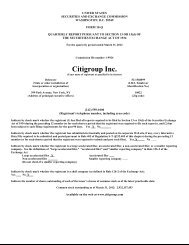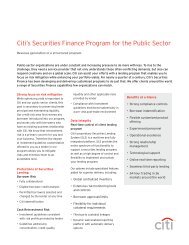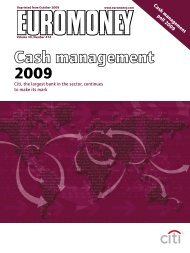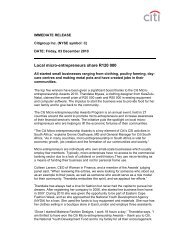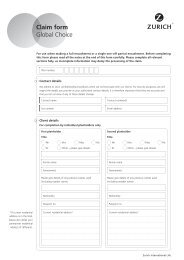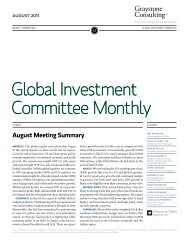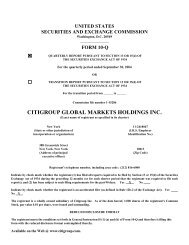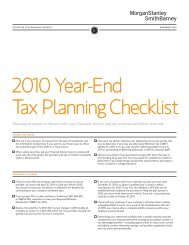Net Investment HedgesConsistent with ASC 830-20, Foreign Currency Matters—ForeignCurrency Transactions (formerly SFAS 52, Foreign CurrencyTranslation), ASC 815 allows hedging of the foreign currency risk of anet investment in a foreign operation. <strong>Citigroup</strong> uses foreign currencyforwards, options, swaps and foreign currency denominated debt instrumentsto manage the foreign exchange risk associated with <strong>Citigroup</strong>’s equityinvestments in several non-U.S. dollar functional currency foreignsubsidiaries. <strong>Citigroup</strong> records the change in the carrying amount of theseinvestments in the Foreign currency translation adjustment accountwithin Accumulated other comprehensive income (loss). Simultaneously,the effective portion of the hedge of this exposure is also recorded in theForeign currency translation adjustment account and the ineffectiveportion, if any, is immediately recorded in earnings.For derivatives used in net investment hedges, <strong>Citigroup</strong> follows theforward-rate method from FASB Derivative Implementation Group Issue H8(now ASC 815-35-35-16 through 35-26), “Foreign Currency Hedges:Measuring the Amount of Ineffectiveness in a Net Investment Hedge.”According to that method, all changes in fair value, including changesrelated to the forward-rate component of the foreign currency forwardcontracts and the time value of foreign currency options, are recorded in theforeign currency translation adjustment account within Accumulated othercomprehensive income (loss).Foreign currency translation adjustment account. For foreigncurrency denominated debt instruments that are designated as hedges ofnet investments, the translation gain or loss that is recorded in the foreigncurrency translation adjustment account is based on the spot exchangerate between the functional currency of the respective subsidiary and theU.S. dollar, which is the functional currency of <strong>Citigroup</strong>. To the extent thenotional amount of the hedging instrument exactly matches the hedgednet investment and the underlying exchange rate of the derivative hedginginstrument relates to the exchange rate between the functional currency ofthe net investment and <strong>Citigroup</strong>’s functional currency (or, in the case ofa non-derivative debt instrument, such instrument is denominated in thefunctional currency of the net investment), no ineffectiveness is recordedin earnings.The pretax loss recorded in the Foreign currency translationadjustment account within Accumulated other comprehensive income(loss), related to the effective portion of the net investment hedges, is$3.6 billion and $4.7 billion for the years ended December 31, 2010 andDecember 31, 2009, respectively.Credit DerivativesA credit derivative is a bilateral contract between a buyer and a sellerunder which the seller agrees to provide protection to the buyer against thecredit risk of a particular entity (“reference entity” or “reference credit”).Credit derivatives generally require that the seller of credit protection makepayments to the buyer upon the occurrence of predefined credit events(commonly referred to as “settlement triggers”). These settlement triggersare defined by the form of the derivative and the reference credit and aregenerally limited to the market standard of failure to pay on indebtednessand bankruptcy of the reference credit and, in a more limited range oftransactions, debt restructuring. Credit derivative transactions referring toemerging market reference credits will also typically include additionalsettlement triggers to cover the acceleration of indebtedness and the risk ofrepudiation or a payment moratorium. In certain transactions, protectionmay be provided on a portfolio of referenced credits or asset-backed securities.The seller of such protection may not be required to make payment until aspecified amount of losses has occurred with respect to the portfolio and/ormay only be required to pay for losses up to a specified amount.The Company makes markets in and trades a range of credit derivatives,both on behalf of clients as well as for its own account. Through thesecontracts, the Company either purchases or writes protection on either asingle name or a portfolio of reference credits. The Company uses creditderivatives to help mitigate credit risk in its Corporate and Consumer loanportfolios and other cash positions, to take proprietary trading positions, andto facilitate client transactions.256
The range of credit derivatives sold includes credit default swaps, totalreturn swaps and credit options.A credit default swap is a contract in which, for a fee, a protection selleragrees to reimburse a protection buyer for any losses that occur due toa credit event on a reference entity. If there is no credit default event orsettlement trigger, as defined by the specific derivative contract, then theprotection seller makes no payments to the protection buyer and receives onlythe contractually specified fee. However, if a credit event occurs as defined inthe specific derivative contract sold, the protection seller will be required tomake a payment to the protection buyer.A total return swap transfers the total economic performance of areference asset, which includes all associated cash flows, as well as capitalappreciation or depreciation. The protection buyer receives a floating rateof interest and any depreciation on the reference asset from the protectionseller and, in return, the protection seller receives the cash flows associatedwith the reference asset plus any appreciation. Thus, according to the totalreturn swap agreement, the protection seller will be obligated to make apayment anytime the floating interest rate payment and any depreciationof the reference asset exceed the cash flows associated with the underlyingasset. A total return swap may terminate upon a default of the reference assetsubject to the provisions of the related total return swap agreement betweenthe protection seller and the protection buyer.A credit option is a credit derivative that allows investors to trade or hedgechanges in the credit quality of the reference asset. For example, in a creditspread option, the option writer assumes the obligation to purchase or sell thereference asset at a specified “strike” spread level. The option purchaser buysthe right to sell the reference asset to, or purchase it from, the option writer atthe strike spread level. The payments on credit spread options depend eitheron a particular credit spread or the price of the underlying credit-sensitiveasset. The options usually terminate if the underlying assets default.A credit-linked note is a form of credit derivative structured as a debtsecurity with an embedded credit default swap. The purchaser of the notewrites credit protection to the issuer, and receives a return which will benegatively affected by credit events on the underlying reference credit. Ifthe reference entity defaults, the purchaser of the credit-linked note mayassume the long position in the debt security and any future cash flowsfrom it, but will lose the amount paid to the issuer of the credit-linked note.Thus the maximum amount of the exposure is the carrying amount of thecredit-linked note. As of December 31, 2010 and December 31, 2009, theamount of credit-linked notes held by the Company in trading inventorywas immaterial.The following tables summarize the key characteristics of the Company’scredit derivative portfolio as protection seller as of December 31, 2010 andDecember 31, 2009:In millions of dollars as ofDecember 31, 2010Maximum potentialamount offuture paymentsFairvaluepayable (1)By industry/counterpartyBank $ 784,080 $20,718Broker-dealer 312,131 10,232Non-financial 1,463 54Insurance and other financial institutions 125,442 4,954Total by industry/counterparty $1,223,116 $35,958By instrumentCredit default swaps and options $1,221,211 $35,800Total return swaps and other 1,905 158Total by instrument $1,223,116 $35,958By ratingInvestment grade $ 532,283 $ 7,385Non-investment grade 372,579 15,636Not rated 318,254 12,937Total by rating $1,223,116 $35,958By maturityWithin 1 year $ 162,075 $ 353From 1 to 5 years 853,808 16,524After 5 years 207,233 19,081Total by maturity $1,223,116 $35,958(1) In addition, fair value amounts receivable under credit derivatives sold were $22,638 million.In millions of dollars as ofDecember 31, 2009Maximum potentialamount offuture paymentsFairvaluepayable (1)By industry/counterpartyBank $ 807,484 $34,666Broker-dealer 340,949 16,309Monoline 33 —Non-financial 623 262Insurance and other financial institutions 64,964 7,025Total by industry/counterparty $1,214,053 $58,262By instrumentCredit default swaps and options $1,213,208 $57,987Total return swaps and other 845 275Total by instrument $1,214,053 $58,262By ratingInvestment grade $ 576,930 $ 9,632Non-investment grade 339,920 28,664Not rated 297,203 19,966Total by rating $1,214,053 $58,262By maturityWithin 1 year $ 165,056 $ 873From 1 to 5 years 806,143 30,181After 5 years 242,854 27,208Total by maturity $1,214,053 $58,262(1) In addition, fair value amounts receivable under credit derivatives sold were $24,234 million.257
- Page 1 and 2:
UNITED STATESSECURITIES AND EXCHANG
- Page 3 and 4:
CITIGROUP’S 2010 ANNUAL REPORT ON
- Page 5 and 6:
As described above, Citigroup is ma
- Page 7 and 8:
Operating ExpensesCitigroup operati
- Page 9 and 10:
FIVE-YEAR SUMMARY OF SELECTED FINAN
- Page 11 and 12:
CITIGROUP REVENUESIn millions of do
- Page 13 and 14:
REGIONAL CONSUMER BANKINGRegional C
- Page 15 and 16:
2009 vs. 2008Revenues, net of inter
- Page 17 and 18:
2009 vs. 2008Revenues, net of inter
- Page 19 and 20:
2009 vs. 2008Revenues, net of inter
- Page 21 and 22:
2009 vs. 2008Revenues, net of inter
- Page 23 and 24:
SECURITIES AND BANKINGSecurities an
- Page 25 and 26:
TRANSACTION SERVICESTransaction Ser
- Page 27 and 28:
BROKERAGE AND ASSET MANAGEMENTBroke
- Page 29 and 30:
Japan Consumer FinanceCitigroup con
- Page 31 and 32:
The following table provides detail
- Page 33 and 34:
CORPORATE/OTHERCorporate/Other incl
- Page 35 and 36:
During 2010, average Consumer loans
- Page 37 and 38:
SEGMENT BALANCE SHEET AT DECEMBER 3
- Page 39 and 40:
Citigroup Regulatory Capital Ratios
- Page 41 and 42:
Capital Resources of Citigroup’s
- Page 43 and 44:
Regulatory Capital Standards Develo
- Page 45 and 46:
DepositsCiti continues to focus on
- Page 47 and 48:
Secured financing is primarily cond
- Page 49 and 50:
Each of the credit rating agencies
- Page 51 and 52:
RISK FACTORSThe ongoing implementat
- Page 53 and 54:
The emerging markets in which Citi
- Page 55 and 56:
is largely uncertain. However, any
- Page 57 and 58:
a short-term Liquidity Coverage Rat
- Page 59 and 60:
understanding or cause confusion ac
- Page 61 and 62:
MANAGING GLOBAL RISKRISK MANAGEMENT
- Page 63 and 64:
CREDIT RISKCredit risk is the poten
- Page 65 and 66:
[This page intentionally left blank
- Page 67 and 68:
(1) 2010 primarily includes an addi
- Page 69 and 70:
Non-Accrual Loans and AssetsThe tab
- Page 71 and 72:
Renegotiated LoansThe following tab
- Page 73 and 74:
Citi’s first mortgage portfolio i
- Page 75 and 76:
Consumer Mortgage FICO and LTVData
- Page 77 and 78:
Second Mortgages: December 31, 2010
- Page 79 and 80:
Interest Rate Risk Associated with
- Page 81 and 82:
North America Cards—FICO Informat
- Page 83 and 84:
CONSUMER LOAN DETAILSConsumer Loan
- Page 85 and 86:
Consumer Loan Modification Programs
- Page 87 and 88:
North America CardsNorth America ca
- Page 89 and 90:
Payment deferrals that do not conti
- Page 91 and 92:
Repurchase ReserveCiti has recorded
- Page 93 and 94:
Securities and Banking-Sponsored Pr
- Page 95 and 96:
The following table presents the co
- Page 97 and 98:
MARKET RISKMarket risk encompasses
- Page 99 and 100:
Trading PortfoliosPrice risk in tra
- Page 101 and 102:
INTEREST REVENUE/EXPENSE AND YIELDS
- Page 103 and 104:
AVERAGE BALANCES AND INTEREST RATES
- Page 105 and 106:
ANALYSIS OF CHANGES IN INTEREST EXP
- Page 107 and 108:
[This page intentionally left blank
- Page 109 and 110:
As required by SEC rules, the table
- Page 111 and 112:
The credit valuation adjustment amo
- Page 113 and 114:
The fair values shown are prior to
- Page 115 and 116:
Key Controls over Fair Value Measur
- Page 117 and 118:
The following table reflects the in
- Page 119 and 120:
The results of the July 1, 2010 tes
- Page 121 and 122:
As a result of the losses incurred
- Page 123 and 124:
MANAGEMENT’S ANNUAL REPORT ON INT
- Page 125 and 126:
• an “ownership change” under
- Page 127 and 128:
REPORT OF INDEPENDENT REGISTERED PU
- Page 129 and 130:
FINANCIAL STATEMENTS AND NOTES TABL
- Page 131 and 132:
CONSOLIDATED FINANCIAL STATEMENTSCO
- Page 133 and 134:
CONSOLIDATED BALANCE SHEET(Continue
- Page 135 and 136:
CONSOLIDATED STATEMENT OF CHANGES I
- Page 137 and 138:
CITIBANK CONSOLIDATED BALANCE SHEET
- Page 139 and 140:
NOTES TO CONSOLIDATED FINANCIAL STA
- Page 141 and 142:
Repurchase and Resale AgreementsSec
- Page 143 and 144:
ecoveries are added. Securities rec
- Page 145 and 146:
Consumer Mortgage Representations a
- Page 147 and 148:
Transfers of Financial AssetsFor a
- Page 149 and 150:
ACCOUNTING CHANGESChange in Account
- Page 151 and 152:
The following table reflects the in
- Page 153 and 154:
Measuring Liabilities at Fair Value
- Page 155 and 156:
Revisions to the Earnings-per-Share
- Page 157 and 158:
FUTURE APPLICATION OF ACCOUNTING ST
- Page 159 and 160:
3. DISCONTINUED OPERATIONSSale of T
- Page 161 and 162:
CitiCapitalOn July 31, 2008, Citigr
- Page 163 and 164:
5. INTEREST REVENUE AND EXPENSEFor
- Page 165 and 166:
Stock Award ProgramsCitigroup issue
- Page 167 and 168:
In January 2009, members of the Man
- Page 169 and 170:
Information with respect to stock o
- Page 171 and 172:
9. RETIREMENT BENEFITSThe Company h
- Page 173 and 174:
The following table shows the chang
- Page 175 and 176:
A one-percentage-point change in th
- Page 177 and 178:
Level 3 Roll ForwardThe reconciliat
- Page 179 and 180:
10. INCOME TAXESIn millions of doll
- Page 181 and 182:
The Company is currently under audi
- Page 183 and 184:
11. EARNINGS PER SHAREThe following
- Page 185 and 186: 13. BROKERAGE RECEIVABLES AND BROKE
- Page 187 and 188: The table below shows the fair valu
- Page 189 and 190: Debt Securities Held-to-MaturityThe
- Page 191 and 192: Evaluating Investments for Other-Th
- Page 193 and 194: The following is a 12-month roll-fo
- Page 195 and 196: 16. LOANSCitigroup loans are report
- Page 197 and 198: Residential Mortgage Loan to Values
- Page 199 and 200: The following table presents Corpor
- Page 201 and 202: Included in the Corporate and Consu
- Page 203 and 204: 18. GOODWILL AND INTANGIBLE ASSETSG
- Page 205 and 206: Intangible AssetsThe components of
- Page 207 and 208: CGMHI has committed long-term finan
- Page 209 and 210: 20. Regulatory CapitalCitigroup is
- Page 211 and 212: 22. SECURITIZATIONS AND VARIABLE IN
- Page 213 and 214: In millions of dollars As of Decemb
- Page 215 and 216: Funding Commitments for Significant
- Page 217 and 218: Credit Card SecuritizationsThe Comp
- Page 219 and 220: Managed Loans—Citi HoldingsThe fo
- Page 221 and 222: Key assumptions used in measuring t
- Page 223 and 224: Mortgage Servicing RightsIn connect
- Page 225 and 226: The Company administers one conduit
- Page 227 and 228: Key Assumptions and Retained Intere
- Page 229 and 230: Municipal InvestmentsMunicipal inve
- Page 231 and 232: Derivative NotionalsIn millions of
- Page 233 and 234: activities together with gains and
- Page 235: Cash Flow HedgesHedging of benchmar
- Page 239 and 240: 24. CONCENTRATIONS OF CREDIT RISKCo
- Page 241 and 242: Trading account assets and liabilit
- Page 243 and 244: The internal valuation techniques u
- Page 245 and 246: In millions of dollars at December
- Page 247 and 248: Changes in Level 3 Fair Value Categ
- Page 249 and 250: In millions of dollarsDecember 31,2
- Page 251 and 252: 26. FAIR VALUE ELECTIONSThe Company
- Page 253 and 254: The following table provides inform
- Page 255 and 256: Certain structured liabilitiesThe C
- Page 257 and 258: 28. PLEDGED SECURITIES, COLLATERAL,
- Page 259 and 260: The repurchase reserve estimation p
- Page 261 and 262: CollateralCash collateral available
- Page 263 and 264: 29. CONTINGENCIESOverviewIn additio
- Page 265 and 266: pursuant to which Citigroup agreed
- Page 267 and 268: court filings under docket number 0
- Page 269 and 270: 30. CITIBANK, N.A. STOCKHOLDER’S
- Page 271 and 272: Condensed Consolidating Statements
- Page 273 and 274: Condensed Consolidating Statements
- Page 275 and 276: Condensed Consolidating Balance She
- Page 277 and 278: Condensed Consolidating Statements
- Page 279 and 280: 33. SELECTED QUARTERLY FINANCIAL DA
- Page 281 and 282: SUPERVISION AND REGULATIONCitigroup
- Page 283 and 284: Citigroup continues to evaluate its
- Page 285 and 286: CORPORATE INFORMATIONCITIGROUP EXEC
- Page 287 and 288:
SignaturesPursuant to the requireme



